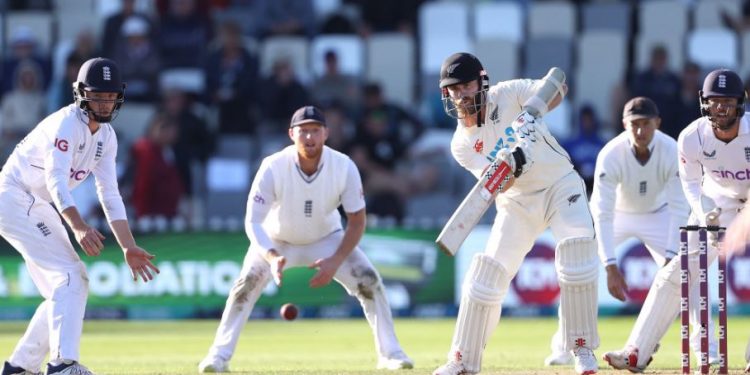Wellington: Tim Southee sounded the rallying cry and Tom Latham and Devon Conway answered the call as New Zealand fought back after following Sunday on the third day of the second cricket test against England.
New Zealand trailed by 226 on the first innings and by stumps was 202-3, only 24 runs in deficit. At the close, Kane Williamson was 25 and Henry Nicholls 18, having seen New Zealand through most of the last session.
Southee battered 73 runs from 49 balls with five fours and six sixes in the morning to show the first spark of defiance before New Zealand was dismissed for 209 in its first innings in reply to England’s 435-8.
Latham and Conway then combined in a 149-run opening partnership which wiped out all but 77 runs of the deficit.
Stokes may be taken to task for enforcing the follow-on, a tactic that is increasingly rare in cricket. His bowlers already had bowled 53.2 overs in the New Zealand first innings in which the England quicks James Anderson, Stuart Broad and Ollie Robinson had shared 36.2 overs.
But Stokes likely had no other choice on a pitch which has lost most of its sting and likely will be ideal for batting on the final day.
The English bowlers, Broad especially, frequently beat the bat in the early stages of the New Zealand second innings. But Latham and Conway showed application which recently has been missing from New Zealand’s top order. New Zealand’s best opening partnership in the three previous innings in the series was 14: Sunday’s stand is now the highest second innings opening partnership ever at the Basin Reserve.
Latham grafted his way to his 26th test half-century from 124 and Conway was slightly quicker, reaching his seventh 50 from 121 balls. On reaching 45, Latham became the seventh New Zealander to score 5,000 test runs.
But Conway was out for 61, caught by Ollie Pope at short leg from the bowling of Jack Leach, and Latham followed soon after for 83, trapped lbw by Joe Root.
“I felt both of us (Latham and Conway) were slightly different. Dev struggled to get away a bit at the start but I managed to do most of the scoring,” Latham said. “The scoreboard was ticking over and we just managed to take it one over at a time and just keep asking them to come back.”
New Zealand found itself under familiar pressure. Then came a man facing his own pressures: Kane Williamson had scored only 10 runs in his three previous innings in the series and needed a big innings as much as New Zealand did.
Williamson hung on for more than two hours until stumps and faced 81 ball to make 25. He now needs only three runs on Monday to overtake Ross Taylor as New Zealand’s leading run-scorer in tests.
England took the second new ball with 10 minutes remaining in the day’s play and it was shared by Ollie Robinson and Leach to keep James Anderson and Stuart Broad fresh for the first session on Monday when the test likely will be decided.
New Zealand has been on the back foot for most of this test, indeed most of the series. But it enjoyed a period on the offensive when Southee was at the crease in the morning.
He resumed at 23 and reached his fifty from only 39 balls. Finally, he was out for 73 from 49 balls which included five fours and six sixes and helped New Zealand reduce England’s imposing first innings advantage.
The innings reflected some of Southee’s unrealized promise as a batter.
Southee made an unbeaten 77 in his debut test against England in 2008 and that innings for a long time led to a hope that he might develop into a genuine allrounder.
That hasn’t come to pass. He now has six half-centuries in tests but they have come in 131 innings and he averages just over 15.
AP






































